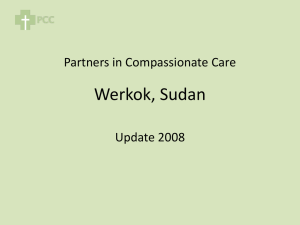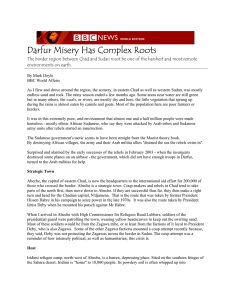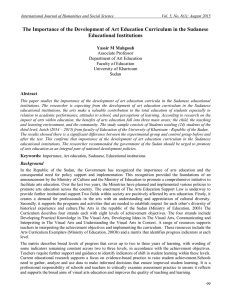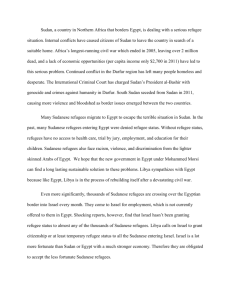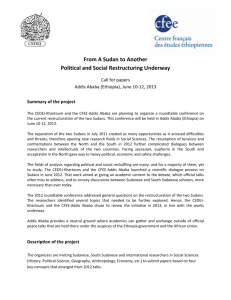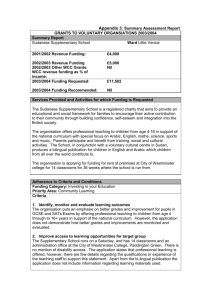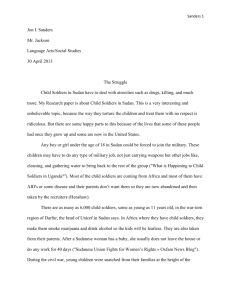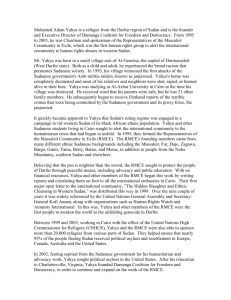In Sudan, Hearing Echoes of Darfur
advertisement
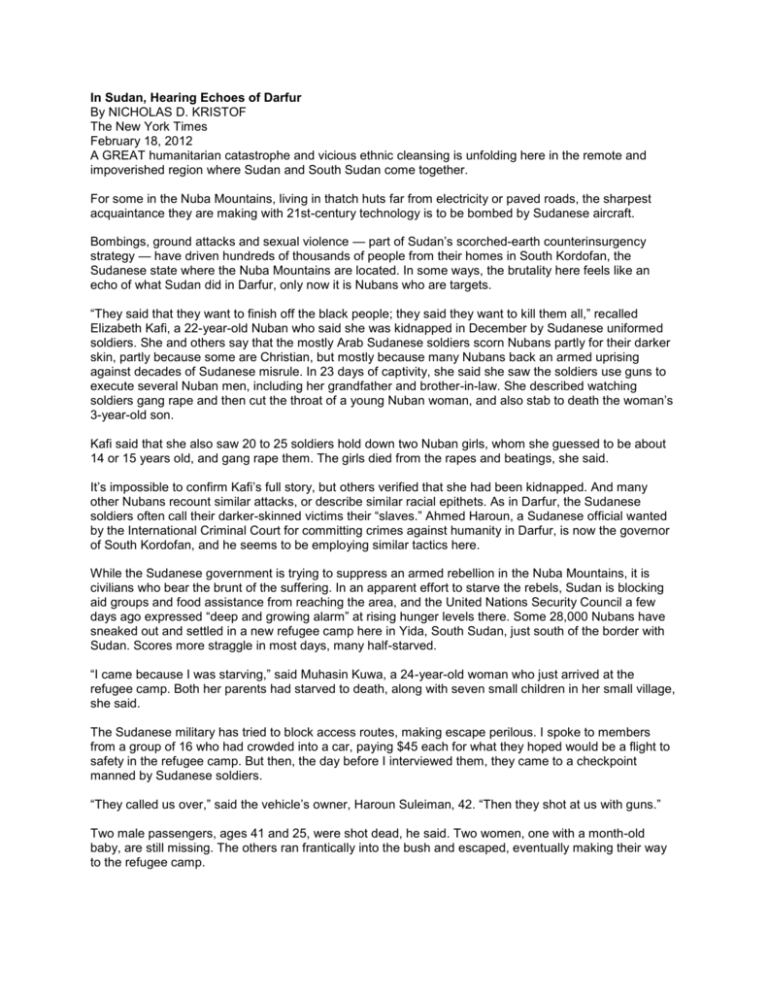
In Sudan, Hearing Echoes of Darfur By NICHOLAS D. KRISTOF The New York Times February 18, 2012 A GREAT humanitarian catastrophe and vicious ethnic cleansing is unfolding here in the remote and impoverished region where Sudan and South Sudan come together. For some in the Nuba Mountains, living in thatch huts far from electricity or paved roads, the sharpest acquaintance they are making with 21st-century technology is to be bombed by Sudanese aircraft. Bombings, ground attacks and sexual violence — part of Sudan’s scorched-earth counterinsurgency strategy — have driven hundreds of thousands of people from their homes in South Kordofan, the Sudanese state where the Nuba Mountains are located. In some ways, the brutality here feels like an echo of what Sudan did in Darfur, only now it is Nubans who are targets. “They said that they want to finish off the black people; they said they want to kill them all,” recalled Elizabeth Kafi, a 22-year-old Nuban who said she was kidnapped in December by Sudanese uniformed soldiers. She and others say that the mostly Arab Sudanese soldiers scorn Nubans partly for their darker skin, partly because some are Christian, but mostly because many Nubans back an armed uprising against decades of Sudanese misrule. In 23 days of captivity, she said she saw the soldiers use guns to execute several Nuban men, including her grandfather and brother-in-law. She described watching soldiers gang rape and then cut the throat of a young Nuban woman, and also stab to death the woman’s 3-year-old son. Kafi said that she also saw 20 to 25 soldiers hold down two Nuban girls, whom she guessed to be about 14 or 15 years old, and gang rape them. The girls died from the rapes and beatings, she said. It’s impossible to confirm Kafi’s full story, but others verified that she had been kidnapped. And many other Nubans recount similar attacks, or describe similar racial epithets. As in Darfur, the Sudanese soldiers often call their darker-skinned victims their “slaves.” Ahmed Haroun, a Sudanese official wanted by the International Criminal Court for committing crimes against humanity in Darfur, is now the governor of South Kordofan, and he seems to be employing similar tactics here. While the Sudanese government is trying to suppress an armed rebellion in the Nuba Mountains, it is civilians who bear the brunt of the suffering. In an apparent effort to starve the rebels, Sudan is blocking aid groups and food assistance from reaching the area, and the United Nations Security Council a few days ago expressed “deep and growing alarm” at rising hunger levels there. Some 28,000 Nubans have sneaked out and settled in a new refugee camp here in Yida, South Sudan, just south of the border with Sudan. Scores more straggle in most days, many half-starved. “I came because I was starving,” said Muhasin Kuwa, a 24-year-old woman who just arrived at the refugee camp. Both her parents had starved to death, along with seven small children in her small village, she said. The Sudanese military has tried to block access routes, making escape perilous. I spoke to members from a group of 16 who had crowded into a car, paying $45 each for what they hoped would be a flight to safety in the refugee camp. But then, the day before I interviewed them, they came to a checkpoint manned by Sudanese soldiers. “They called us over,” said the vehicle’s owner, Haroun Suleiman, 42. “Then they shot at us with guns.” Two male passengers, ages 41 and 25, were shot dead, he said. Two women, one with a month-old baby, are still missing. The others ran frantically into the bush and escaped, eventually making their way to the refugee camp. The Sudanese government bombed this refugee camp in November, and, just a week ago, it bombed the nearby town of Jau, in South Sudan. Fears are growing of a new all-out war between Sudan and South Sudan, in part because of an oil dispute. South Sudan separated from the rest of the country just in July, and the two sides can’t agree on the oil pipeline fees that the South should pay. The South then shut off oil production, so both countries are now facing an economic crisis. Some experts warn that the North may try to seize oil wells from the South. Nuban children are already growing up in war. When kids surrounded me in the refugee camp, I asked them how many had lost a brother or sister in the war. About one-third raised their hands. When the food runs out in the Nuba Mountains, perhaps in two or three months, there will be a risk of mass starvation. I saw one 4-year-old girl at a feeding center run by Samaritan’s Purse, the aid group, who weighed only 22 pounds. Unless outside countries enforce humanitarian access into the Nuba Mountains, we can expect more famished children like her. The Sudanese armed forces try to keep aid workers and journalists out, so the story of suffering has not received much international attention. I’m going to try to slip into the Nuba Mountains and report back. Stay tuned. Copyright 2012 The New York Times Company
